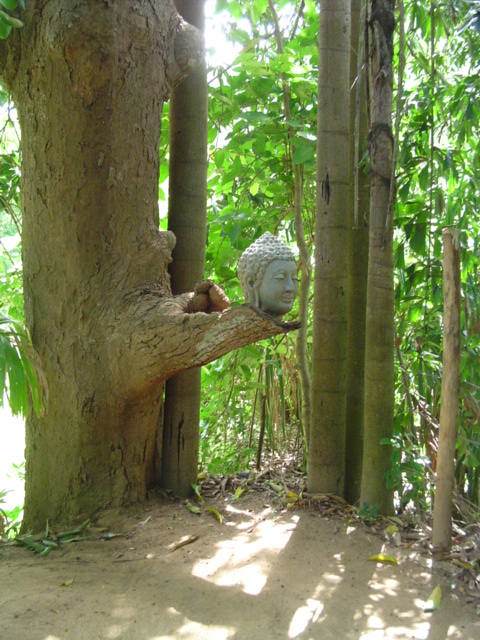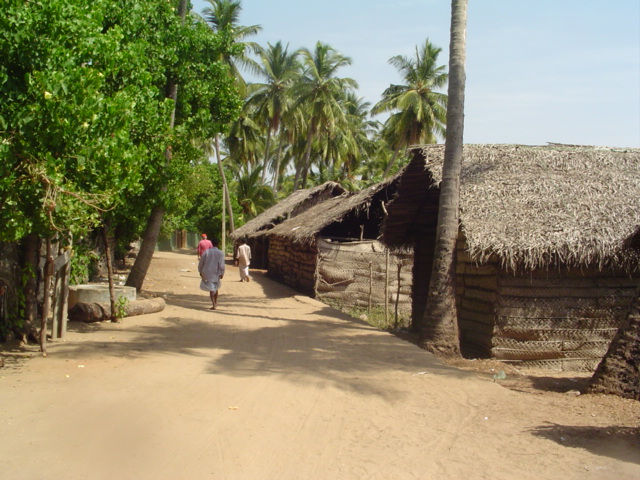Based in Kyoto, Edward’s work has appeared in a variety of print and online publications. Co-editor of the Deep Kyoto Walks anthology, he is currently at work on a series of books about walking Japan’s ancient highways. (For an interview with him conducted by Michael Lambe, see here. For his blog, click here.)
Around 11:00, we set off down Ella Gap, becoming part of the scenery that I’d been enthralled with since yesterday afternoon. We eventually left the main road for a smaller, rougher road trafficked heavily by trucks loaded with sugarcane, moving through dry scrub stretching desperately for dry earth. It was a desolate landscape, dotted with simple huts of thatch unprotected by walls. I wondered whether such extreme desolation and poverty is a factor in breeding rebellion, since this area has long been a hotspot in this country’s long Civil War. As if to emphasize this idea were the multiple police checkpoints, each one fortified and heavily armed. One village had one of those “School Crossing” signs except that the legs of one of the kids pictured had faded away. I thought of landmines and irony.
At one point we nicked the southern edge of Lahugala National Park. Three small elephants were standing in the shade and further off, a huge male was heading toward a large body of water. The road continued, arrow straight, until we reached its end at the dusty town of Pottovil. A group of foreigners, looking huge next to the locals, bought bananas from a vendor. Nearby, a cow lay in the shade atop a pile of leaves.
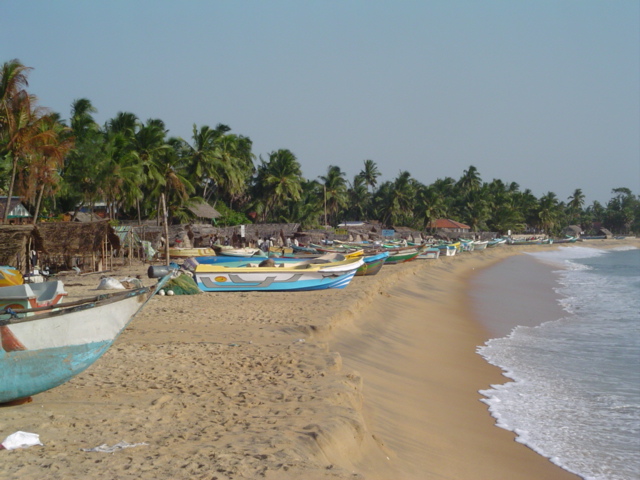
We drove across the bridge into Aragam Bay. Our first stop was Stardust, where I’d hoped to stay, but they were filled up with the surfers who were in town for the 1st Annual British Surfing Competition. We settled on lunch, during which I talked awhile with Per, the hotel’s Danish owner. He told me of the changes he’d seen during his 24 years here. Property was selling well, especially since, due to the lull in the war, they were soon to introduce flights geared toward surfers. Affiliated with Sri Lankan Air, one of the Surf Contest’s sponsors, these flights would land directly on the lagoon. There were rumors that the town’s fishing village would be moved further south. Families that had been here for generations could stay, but those newer to the area would have to go. In five year’s time, there’d be high hotels towering over the fishing huts, negating all the charm this town now had. Per himself was doing all he could to slow this. This friendly, charming man had had the foresight to buy vast amounts of land, and was now screening potential buyers, selling not to hotels but to families wishing to build homes here. (I was saddened to learn that he’d been carried off by the Indian Ocean Tsunami six months later.)
On the way out, I noticed on the bookshelf a copy of “The Inheritance of Loss,” the book I’d accidentally dropped from the train outside Kandy. I tried to convince Per’s wife to sell it to me, but she wouldn’t, saying that she doesn’t sell old friends. (“How about introducing your friend to someone new,” I thought.) I tried flattery, I tried flirtation, but she wouldn’t budge. Never underestimate an old woman’s sentimental attachment to her books.
We drove down the town’s single road, lined with English signs for hotels, Internet, food. Plenty of young foreigners were around, many carrying surfboards, all with dissatisfied cool written on their faces. Aragam Bay was the first backpacker haven I’d yet seen in Sri Lanka. There was lodging available at Rupa’s Guest House, down in the fishing village. It was a collection of about a dozen bungalows set on a small lane. It was the closest lodging to the surf break, so on every porch there were surfers drinking and smoking and chatting throughout the heat of the day. It seemed a mellow little scene, with many of these guys staying for a month or two. Over lunch I got to talking with an Israeli guy and a Swedish guy who told me that this spot had been on the international surf circuit for years. The Aussies had come even during the worst parts of the war. On one occasion, when heavy fighting broke out in the town, the surfers had grabbed their boards and had met at the break, ready to paddle far out if things got too intense. But with the strong currents around here, I doubt that that would have been very safe either.
After lunch, the guys all went out to surf and I tagged along. Being Sunday, there were lots of local families around. Kids splashed in the still shallow water of the lagoon, while their mothers and sisters stood nearby in their saris. The fathers seemed to enjoy ogling the foreign women. I sat in the sand at the break watching the surfing. There was no shade and it was very hot. I was eventually joined by some locals, no doubt because I was sitting on my own. They came in groups of two, in their baseball caps, jeans, and T-shirts. I wondered if these had been given to them by friendly surfers, or if it was some sort of booty. One especially talkative guy was leaning toward me, his hand uncomfortably close to my bag. Once again I thought about how there is no privacy or personal space in a village. Here in Sri Lanka, I suppose it must be rude to talk to someone without making eye contact. I was fine with chatting, so long as I could watch the surfing, but they kept stealing my attention by saying, “Hello,” or tapping on my shoulder. When one guy sat down right in front of me, in my line of view, I decided I’d had enough. I joined a Japanese girl and a Swiss girl sitting on the dune behind. The sand here was a bizarre reddish-orange color. The Japanese girl was travelling with her surfer boyfriend. Originally from Nara, she’d lived in Santa Barbara for 5 years, though not at the time when I had lived there. We chatted awhile about familiar places and things, though she didn’t seem to want to talk in Japanese, something I’ve noticed about Japanese I meet on the road. A Hawaiian guy eventually came over to sit with us. I asked him about surf etiquette here. He said that there wasn’t any, everyone dropping in on everyone else. I’d assumed so, since there were few locals and no one knew each other. We sat until we were in shade, the sun dropping below the dune behind us. Down on the beach, a wave surprised a group of women sitting in the sand, soaking their saris.
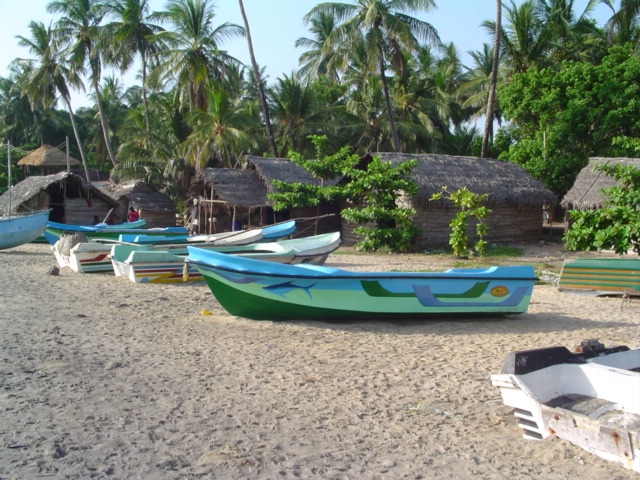
Back at Rupa Guest House, our driver Somadasa was slightly upset. When he’d called this morning to check on the availability of rooms, he’d been told that there were driver’s facilities, but here he saw they were like a dog’s quarters, with no bed. I asked him what he’d do, and he said he’d find a place in town, even if it were expensive. Usually he’d sleep in the car but he’d been sick so he wanted a bed. Plus he was afraid. This was a Tamil area, and he was Singhalese. On the drive in, I could sense his fear. With all the security and guns, the tension around here was definitely high. But his fear had roots deeper than this. I was to find out later that on his last trip out here 15 years ago, he’d lost his car, and four other drivers had been killed. Looking around at the surfers on their porches, listening to the Beastie Boys and getting high, I thought about how stupid we all were. Stupid to be partying and hanging out in a war zone. Despite the Norwegian-led peace talks, things have a way of changing quickly here. Makes a good travel story, but… I had a hard time relaxing here, despite the perfect water, beautiful beach, good food, friendly people. Something felt a bit off.
Somadasa had called Rupa’s owner a bad man. I wasn’t so fond of him either. A Tamil who called himself Peter, he was a seedy man who walked around in a Body Glove tank top and a sarong. His speech and gestures were not what I’d come to expect from Sri Lankans. I’d noticed this about the other locals here too. Perhaps that was what had disturbed me most about Aragam Bay: the people were too Westernized, becoming this strange hybrid that didn’t quite work. It seemed off because they were Westernized in all but lifestyle. They still lived in thatch and grass huts on the beach. They still fished from dugout canoes, in the style of their ancestors. In my experience, most backpacker towns have the tendency to isolate you from the local population. But here we had constant contact with them and their dichotomy. Maybe this is how all these places are, and I just hadn’t seen it.
My bungalow shared an attached porch with my neighbor, Fred the Swede. We drank beer and talked travel until night fell. Nearby, someone was playing U2’s Joshua Tree album. This led us to talk about music, jokingly debating the worldwide impact of Abba vs. Elvis. When Lee joined us later, we headed up our dark quiet dusty road into town, passed by young men on bike and motorcycle. Further on were the silhouettes of large, hulking bodies in search of dinner. We decided on the buffet at Siam View, a treehouse restaurant run by a smiley Thai woman. The menu bragged about their neutrality during the war. The place was filled with foreigners, including the English couple that I’d met in the train station in Kandy. It was weird to see this many tourists, probably numbering the combined total I’d seen in country thus far. Above our heads were two TVs with the sound turned off, showing subtitled Thai versions of Dirty Dancing and some supernatural Hong Kong Kung Fu flick.
On our way back, Lee bought some pretty sketchy ice cream. A party down the beach was throwing a glittery strobe light through the palm fronds overhead. Bass boomed in my chest. At the top of town, Stardust was having an intimate party for 200. No one I talked to seemed to want to go. We instead sat again on our ‘stoop’ talking nonsense until it was late enough to sleep.
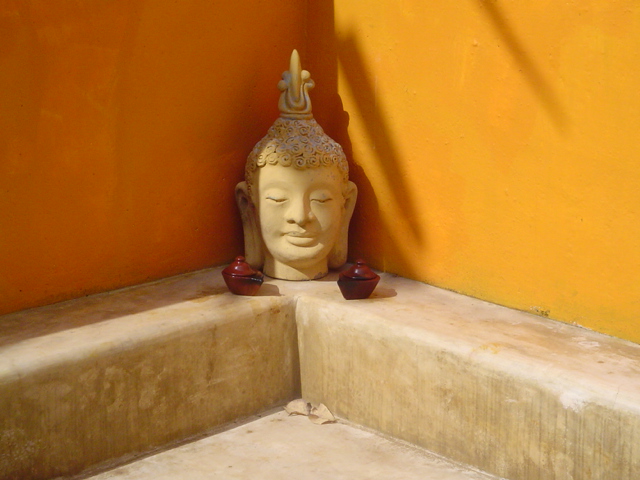
I awoke early, having not slept well for the heat and the noise. The beach was quiet, deserted. A lone fisherman was tossing his net into the surf, letting its drifting movements snag a collection of colored fish and even one sea snake. There were already a few surfers out. The waves weren’t as big as yesterday, but those in the water were rewarded with beautiful tubes. A few of them must’ve been pro. I sat on the dune talking with a Japanese guy from Kagoshima. He’d been here four times.
I cooled off in the water but like yesterday, I got out quickly. The water was warm but shallow over the reef, and the large swells and quick currents threatened to drag me across the coral. So I walked down the beach awhile, round the bend and out of sight of people. I gazed at the shape of the shoreline stretching south. The waves broke heavily on the rocks and reef, sending spray 20 feet into the air. I thought that if I kept walking, I’d probably never leave beach, and in a month or so, I’d have traced this island’s teardrop shape back here to the same spot. The sea was turquoise, the jungle green, the dunes red. It was beautiful and on this sunny morning, it was all mine. Then I remembered that this was still Tamil Tiger territory, and suddenly, that green jungle grew eyes. I turned back, each step quickening across the sand. I no longer noticed the natural beauty here, my mind far too busy preoccupied with landmines and the science of probability.
